In a video posted on social media 11 days before the September 30 parliamentary election, former three-time prime minister Robert Fico, leader of the populist Smer party, accused Peter Pellegrini, leader of the Smer splinter party Hlas, of being open to cooperation with the liberals after the election in exchange for the post of prime minister.
“Smer gave him everything,” Fico said. “Now we stink to him.”
Indeed, in his book about his vision for Slovakia published over the summer, Pellegrini compares his political story to a “cheesy American movie”, giving only a truncated account of his experience.
Pellegrini skips over the bits about him being suspected of taking a 150,000-euro bribe stuffed into a champagne gift box at a time when he was deputy finance minister or failing to credibly explain how he managed to buy a 410,000-euro three-room flat in an exclusive neighbourhood under Bratislava Castle five years ago. Instead, he recounts how he joined Smer in 2000 and rose quickly through the ranks to become deputy finance minister, education minister, speaker of parliament, deputy prime minister and, in 2018, after the contract killing of an investigative journalist, replaced Fico as prime minister until the 2020 parliamentary election, when Smer suffered an overwhelming defeat by the self-proclaimed anti-corruption movement OĽaNO. A few months later, Pellegrini left Smer to found his own party, Hlas.
Also in his video, Fico advised leftist voters to vote for Smer instead of Hlas, a party that Fico calls a sister party when it is useful for him, to strengthen its position and to be able to form a government with other political partners, such as ultranationalist politicians from the Slovak National Party (SNS).
But in a confident response, Pellegrini slammed Fico’s hypocrisy and reminded him that Smer’s future in a government would depend on Hlas after the election, despite Smer being ahead in the polls at the time.
“Except for the SNS and Hlas, you have no other political partners. Other parties have rejected Smer,” Pellegrini said in his video riposte to Fico.
Simultaneously, Pellegrini said he could not imagine joining forces with the liberals to accomplish his pre-election promises to the Slovak people. On top of that, in a televised debate, which Fico referenced in his video, Pellegrini doubted MEP Michal Šimečka, leader of the liberal Progresívne Slovensko (PS) party, that he could run the country given his lack of experience.
Pellegrini went on to suggest that he was ready to become prime minister again. The fact that Smer and the PS were ahead in the polls – and the former would go on to win the election – did not appear a problem for the Hlas leader.
“If we got a mandate that is strong enough, we should aim for the post of premier,” he said.
Šimečka, whose party wants to stop Smer from returning to power at nearly any cost, did not say at the time whether PS would be willing to give up the post of prime minister to achieve this. But a week after Smer won the election, PS, the runner-up, said it would indeed offer the post to Hlas.
“I am ready to give up the post of prime minister in favour of Pellegrini,” said Šimečka.
Hlas has repeatedly said that it hasn’t rejected a liberal-conservative coalition, but it won’t be Pellegrini alone who decides the future of Hlas and Slovakia. It is the party’s 20-member board, which is said to be split on which coalition Hlas should choose. The coalition with Smer is purportedly preferred.
A man who says that his "big dream" is that more people will return to Slovakia than leave the country, Pellegrini is currently holding talks with all leaders. Formal talks continue only between Hlas and Smer for now.
Even so, Pellegrini would most likely not serve as premier in a Smer cabinet. “We’ll wait and see who will be more generous,” Pellegrini said. “I’m not going to be a ‘bag holder’ for anyone.”
‘Fico and Smer is the past’
As the election winner, Fico was asked by President Zuzana Čaputová to start formal negotiations on forming a coalition government with other political parties. In this, Čaputová, who is suing Fico over lies he continues to spread about her, decided to follow constitutional tradition.
The Smer leader has until October 16 to prove to the president he can muster a majority in parliament and to brief her on who might sit in his cabinet. The president can refuse to appoint some of his potential candidates for ministers.
Fico has so far not commented on the negotiations with Hlas and the SNS. His relationship with Pellegrini remains far from friendly. After the defeat in the 2020 election, Pellegrini called on Fico to step down as Smer leader. Fico refused. In response, Pellegrini and 10 well-known Smer MPs, who became known as “Pelle’s Eleven”, quit Smer.
“I can no longer imagine a political future in tandem or cooperation with Robert Fico in some joint project, even under different conditions,” Pellegrini said in 2020, describing the world of Fico’s as a “world of the past”, while his was a “world of the future”.
Fico considered the decision by Pellegrini and the others to be “absolutely shameful”.
“The nation always likes betrayal, but hates traitors,” Fico responded, reminding Pellegrini it was the Smer leader who made him prime minister and speaker of parliament.
Their relationship was not great during Pellegrini’s premiership from 2018 to 2020 either. SNS leader Andrej Danko, one of Smer’s then-coalition partners, complained about Pellegrini and Fico’s contradictory statements on a variety of matters.
“The prime minister should obey his party leader; he was chosen by Fico and Smer,” Danko said at the time.
During this year’s election campaign, despite their common past and closeness on social and economic issues, Pellegrini continued to refer to Smer and Fico as something that belongs to the past, while Fico suspected Hlas of cooking up a coalition with liberal parties.
Danko, on the other hand, kept alive the dream of a future government that would be formed by Smer, SNS and Hlas. He also managed to convince smaller ultranationalist parties to join the SNS’s slate for the election in an effort to stop “liberalism”. The tactics helped the party pass the threshold to enter parliament.
Smer’s ‘bag of explosives’
A critic of the sanctions against Russia and moves to scrap unanimous voting in the EU as well as an opponent of sending more military aid to Ukraine, Fico’s chances of becoming Slovak premier for the fourth time hang in the balance, say analysts.
“As the leader of the winning party, I will run for the post of prime minister,” he said the day after his Smer party won the election.
In a podcast, professor of political science Darina Malová opined that Fico won’t agree to Pellegrini becoming prime minister. “Pellegrini will always play second fiddle to Fico,” Malová said, explaining that Fico is aggressive in his way of doing politics while Pellegrini favours persuasion and is less prone to displays of arrogance.
The latest media reports suggest that Fico has offered Pellegrini the post of speaker of parliament.
Boris Zala, one of Smer’s founders and a former MEP, suggested in recent interviews that Pellegrini wants to be known as the “moderniser of Slovakia”, which is why he would not want to sit in a government with Fico.
“I think that this [position of prime minister] is the most important card for him to join any coalition,” argued Zala.
But observers warn of the dangers for Hlas if the party joins forces with Smer and the ultranationalists. Smer could take credit for any successes of the potential Smer-led government and, in time, reabsorb Hlas. A case in point: the parties that Smer ruled with in its last government from 2016 to 2020, SNS and Most-Híd, were shut out of parliament after the election in 2020.
“If Hlas wants to be a project for several decades, going into government with Smer is high risk,” Malová thinks.
Zala, moreover, talks about Smer’s “luggage from the past that is full of explosives”. After Smer was ousted from power, a number of corruption investigations began. Around 40 people linked to former Smer governments have since been convicted, while dozens of others are being investigated or prosecuted. Fico himself is being investigated in a case that concerns the alleged misuse of the police to discredit Smer’s political opponents.
“It is certain that it will explode at some point and Pellegrini as prime minister will have to deal with it,” Zala claims.
But Smer would not be the only problem for Pellegrini.
Unstable SNS wants to stop liberalism
Being in a coalition with SNS would not contribute to a stable government, which Pellegrini has stressed for months is important.
SNS will only actually have one MP, its pro-Russian leader and former speaker Andrej Danko. The butt of numerous jokes inspired by his way of communicating, Danko shook hands with Putin, took a selfie with Russian State Duma Chair Vyacheslav Volodin, and published an open letter several weeks before Russia invaded Ukraine in which he addressed Russian Foreign Minister Sergei Lavrov as “my dear friend”. In addition, Danko opposes military aid for Ukraine.
Pellegrini, who sees Slovakia’s future firmly in the EU and NATO, has claimed that Slovakia has not got much military material that could be donated to Ukraine left, but he supports Slovak arms companies in the production of weapons as they create jobs.
Danko, like Fico, also favours the politics of Hungarian Prime Minister Viktor Orbán. Just like Orbán, they have said that they are ready to criticise the EU and NATO whenever it is necessary to defend Slovakia’s interests.
“If people give us a mandate, I will fight for Slovaks like Orbán does for Hungarians,” Danko said during the summer.
The SNS nominally obtained 10 seats in parliament, but the remaining nine seats will be taken by people who are not SNS members and have their own parties and agendas. Some are notorious faces from the disinformation scene, others consider bears to be biological weapons or enjoy taking pot shots at the LGBT+ community, and some have entered parliament on the slate of a far-right party in the past.
“The coalition with SNS [and Smer] would, in fact, be a five-party coalition,” political analyst Jozef Lenč told the Pravda daily. “If Hlas rejected the far-right party Republika, it should be a problem for Hlas to be in a government with people who mentally represent the world of Republika.”
On October 7, when the SNS held a special party conference, Danko announced that his caucus will be united and that the SNS will only support a government that will be led by Fico.
“Pellegrini must now answer the question as to whether he will succumb to the attempts of liberals, or whether he is ready to take the post of speaker of parliament and cooperate with Fico’s government,” Danko said.
He added that the SNS would also be open to supporting a Smer-led government of which Hlas and the Christian Democratic Movement (KDH), not the SNS, would be members in order to stop liberal parties from taking power.
Red lines
But KDH has refused to enter into a coalition with Smer. The final decision on the post-election future of the movement will be made during the party’s assembly, though. It is scheduled for October 14.
Smer would have a stronger position in parliament with KDH in tow, 81 seats, rather than the 79 seats a Smer-Hlas-SNS coalition would have.
In 2006, some KDH members were considering a coalition with Smer to prevent Smer from forming a government with SNS, which KDH considered extremist, and HZDS, which was led by former semi-authoritarian prime minister Vladimír Mečiar. In the end, the party’s hesitation and disunity of party members on this matter caused Smer to form the government with SNS and HZDS. In the next elections, Smer stole voters from HZDS and SNS.
In this year’s election, the far-right party Republika did not get into parliament. Smer, which has shifted its rhetoric from leftist to nationalist and ultraconservative in the past decade, is believed to have dug Republika’s grave to some degree.
“We know very well that Smer has so far absorbed all its coalition partners,” KDH leader Milan Majerský told the conservative daily Postoj. “I don’t want to be a KDH undertaker.”
Apart from Smer, the liberal agenda is another problem for KDH. Majerský has called LGBT+ people a “plague” on live TV and labelled some elements of PS’s manifesto as “extremist” on public radio in September. Majerský has long refused to cooperate with liberal parties due to their ambition to improve the life of and grant rights to the LGBT+ community.
“We will never give up on this red line,” Majerský said.
After PS leader Šimečka decided to offer the post of prime minister to Pellegrini, KDH changed its rhetoric. It no longer speaks about going into opposition – a move that could have harmed the party’s reputation if it did not make an effort to prevent Smer’s return to power.
“We are open to further negotiations on the best possible alternative for Slovakia, but our priorities and red lines still apply,” the board of KDH announced on October 6.
Pellegrini is said to be a more acceptable leader for KDH, a party that has already sat with liberal parties in past governments.
In an interview three years ago, the 48-year-old singleton was asked about whether he was gay. The publisher censored this part of the interview and the weekly’s editor-in-chief resigned as a result.
A coalition made up of KDH, PS, Hlas and the liberal SaS party would control 82 seats in the 150-seat parliament.
Zala believes that Pellegrini would be a better prime minister in any liberal-conservative coalition.
Pellegrini is currently holding talks with all leaders, but formal talks continue only between Hlas and Smer for now. If negotiations with Smer fail, Pellegrini is ready to sit down at the negotiating table with PS, SaS and KDH. Nevertheless, he has already made it clear that Hlas would quit this four-party coalition if any of the partners violated mutually agreed deals.
But even if there is an exclusive offer on the table for Pellegrini as prime minister, there is one post that PS will not give up: that of interior minister. This is because the interior minister selects the police chief and Pellegrini has already said he would sack the current police chief Štefan Hamran. Pellegrini also wants to look into whether Slovakia even needs the Special Prosecutor’s Office and the Specialised Criminal Court, both of which deal with the most serious crimes like corruption. Fico has similar plans.
If Pellegrini attempted to bring ongoing high-profile investigations to a halt, this would most likely lead to the collapse of any potential four-party coalition.
But today, even the liberal party SaS thinks that PS should sacrifice the Interior Ministry.
“If Hlas managing the Interior Ministry is to prevent another Smer government, it is certainly a better way for Slovakia than the Justice Ministry and the Interior Ministry in the hands of Smer,” said a former justice minister for SaS, Mária Kolíková.
This story was produced in partnership with Reporting Democracy, a cross-border journalism platform run by the Balkan Investigative Reporting Network.


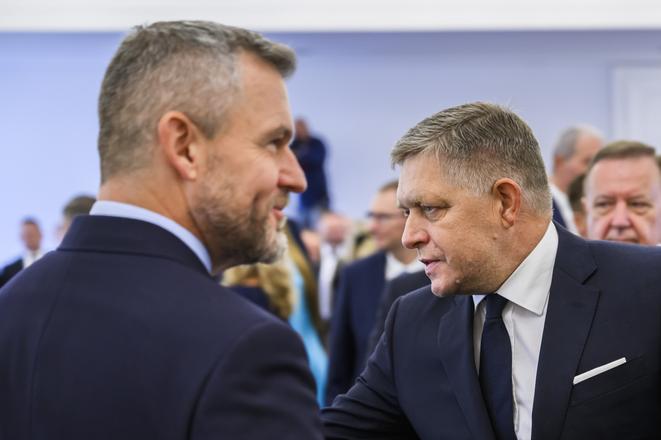 Hlas chair Peter Pellegrini (l) and Smer leader Robert Fico (r) meet in the historical parliamentary building on October 9, 2023 to receive a certificate confirming them as MPs. (source: TASR - Jaroslav Novák)
Hlas chair Peter Pellegrini (l) and Smer leader Robert Fico (r) meet in the historical parliamentary building on October 9, 2023 to receive a certificate confirming them as MPs. (source: TASR - Jaroslav Novák)
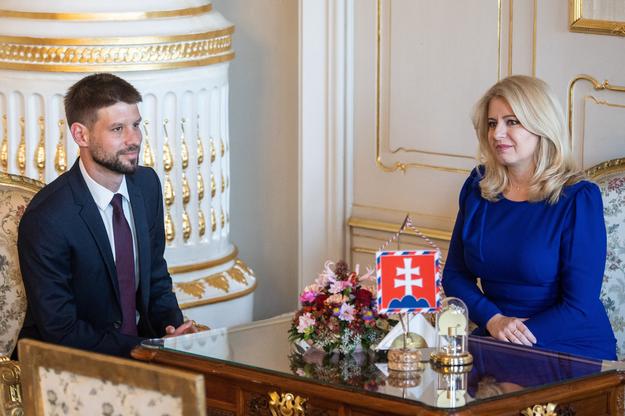 PS leader Michal Šimečka meets with President Zuzana Čaputová in the Presidential Palace on October 2, 2023. (source: SME - Jozef Jakubčo)
PS leader Michal Šimečka meets with President Zuzana Čaputová in the Presidential Palace on October 2, 2023. (source: SME - Jozef Jakubčo)
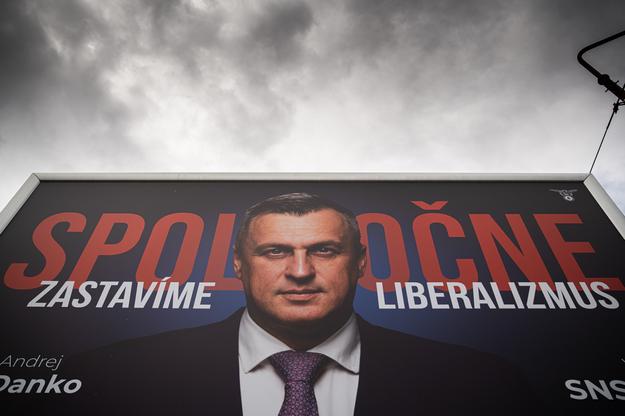 SNS chair Andrej Danko is portrayed on a billboard that says "We'll stop liberalism together". (source: SME - Marko Erd)
SNS chair Andrej Danko is portrayed on a billboard that says "We'll stop liberalism together". (source: SME - Marko Erd)
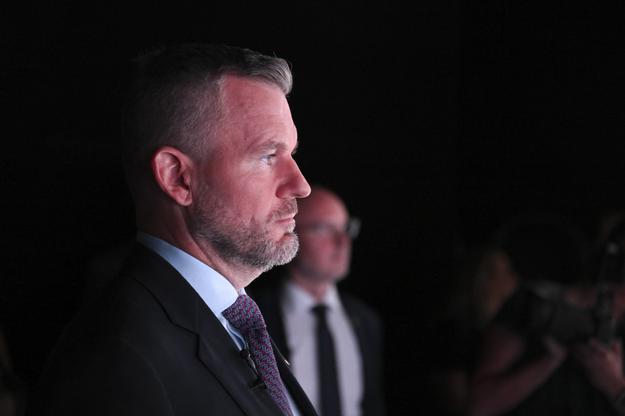 Hlas chair Peter Pellegrini as pictured before one of the first post-election TV debate on October 1, 2023. (source: TASR - Jaroslav Novák)
Hlas chair Peter Pellegrini as pictured before one of the first post-election TV debate on October 1, 2023. (source: TASR - Jaroslav Novák)
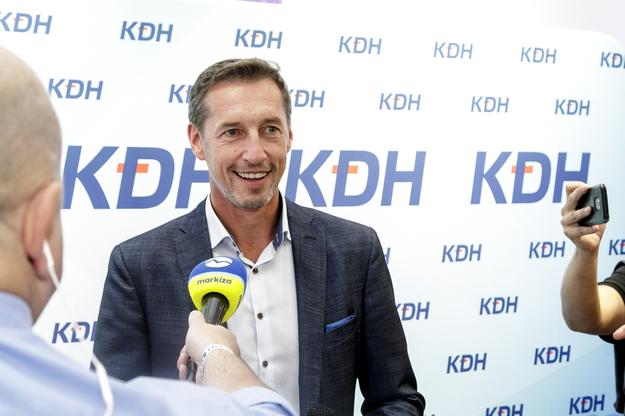 KDH chair Milan Majerský talks to a journalist during the September 30 election night. (source: TASR - Dano Veselský)
KDH chair Milan Majerský talks to a journalist during the September 30 election night. (source: TASR - Dano Veselský)
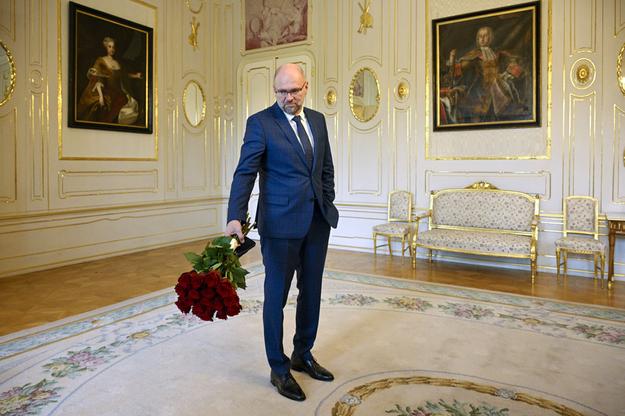 SaS chair Richard Sulík shortly before his meeting with President Zuzana Čaputová on October 9, 2023. (source: TASR)
SaS chair Richard Sulík shortly before his meeting with President Zuzana Čaputová on October 9, 2023. (source: TASR)